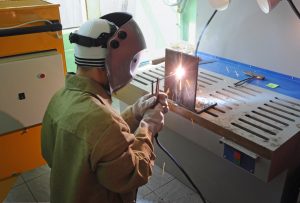Vocation, Vocation, Vocation
 When Tony Blair came to power in 1997, he famously said that his government’s priority would be ‘education, education, education.’
When Tony Blair came to power in 1997, he famously said that his government’s priority would be ‘education, education, education.’
But what kind of education did he mean?
The answer was simple: a university education.
His target was to send half the nation’s students to university – and it’s been achieved.
But what did Tony Blair say about the remaining 50 percent of children who wouldn’t end up at university? Not a lot as it happens.
The bell-curve measuring academic ability tells those of us in the educational sector that only about 20%-25% of people are highly academic or bookish and are really suited to university.
This means that a high number of youngsters are pursuing the wrong kind of education to a high level.
Vocation, vocation, vocation!
Writing essays and analytical skills do not suit everybody.
It doesn’t mean that those who do not have these skills are not intelligent; it means they have different skills or a mix of skills that should be applied in other ways.
We all need basic skills in numeracy and literacy but not necessarily to the level of university education.
Furthermore, there has been a tendency to lower the entry-level and course content available in university education, which impacts on the value of the qualification.
Degrees have become two a penny and their range of subject material has increased exponentially.
It has created a curious hybrid kind of education that doesn’t know what to call itself.
It is neither highly academic or focussed vocationally and yet it has a ‘degree’ attached to it.
Universities should require academic rigour, but this has slipped away since Tony Blair’s famous speech.
There are so many institutions that are called a university, but are they really offering university-level education?
At one point only around 15% of people went to university. This was probably too low, but now more than half are going – too high. The standards must have been lowered!
Our government is finally realising that we must play to people’s strengths and also link this to what the economy actually needs.
Further education and apprenticeships have been the ‘Aunt Sally’ of the education system for too long.
The argument that we were moving away from the manufacturing industry and vocational skills to a more service-based and digitised economy has worn thin as we see countries such as Germany powering ahead in their manufacturing and other sectors.
At one point the UK was the ‘workshop of the world’ and has traded this for an industry in the generation of ideas and financial services.
But what happens when all the other economies can do this just as well?
As we approach the fourth industrial revolution and the application of artificial intelligence, we need to train people to meet this challenge.
It not only involves training in computer technology at university level but also new kinds of manufacturing that provides the robots, infrastructure, and equipment of the future.
This will require vocational training that is highly practical and ‘on the job’ in style.
As part of the Government’s educational reforms, £65 million has been pledged for a Strategic Development Fund.
Businesses will be encouraged to work alongside colleges to develop tailored plans to meet local skills needs.
The proposals, according to the Department for Education, are designed to help end the misconception that a degree is the only route to success and a good job.
The Skills for Jobs White Paper will also include plans to launch a nationwide recruitment campaign to get more talented individuals to teach in further education.
Unfortunately, the £65 million is hardly sufficient, but at least it’s a start.
Far more is required. We need to restructure the educational system.
I would start in schools – long before students start thinking about university.
It is clear that by the time child reaches 14 the die is cast in terms of academic or vocational routes.
We should be directing the highly academic children (25%) to pursue this route from 14-plus and the other 75% of children should be following a vocational route.
This is what happens in Germany and it works.
The two routes are not mutually exclusive. It is possible for a child to move from one to the other, but they have clearly marked out paths that lead somewhere.
It is also important to end the stigma of those who choose not to go to university. There is a snobbishness among a certain type who look down their noses at those without a university education.
Each educational route should be equally celebrated, and the rewards should be the same.
Our system currently forces all the children to do the same qualifications right through to 16 and many find the academic rigour irrelevant to their needs and they simply switch off.
Having worked in the state system, I saw this time and time again.
Many youngsters would say to me ‘why am I doing this? I’m not interested in it and I don’t see it as relevant to me.’
I could only agree with them but then had to tell them they had no choice. I would have preferred to tell them that they must do English, maths, and some science, but the rest of the curriculum would focus on exactly what was relevant to them.
If I could have said this, I’m sure many students would have stayed more engaged in their studies.
This would not only be good for them, but good for the country.
There is no point in trying to force square objects into round holes.